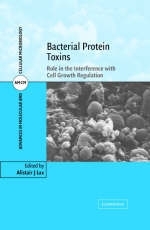
Bacterial Protein Toxins
Cambridge University Press (Verlag)
978-0-521-82091-2 (ISBN)
- Titel z.Zt. nicht lieferbar
- Versandkostenfrei innerhalb Deutschlands
- Auch auf Rechnung
- Verfügbarkeit in der Filiale vor Ort prüfen
- Artikel merken
Bacterial toxins that act inside cells interact very specifically with key components of the cell and some even manipulate the cell in subtle ways for their own purposes. These potent toxins, described in this 2005 book, will be of interest to both microbiologists and cell biologists. Some of these toxins are conventional multidomain toxins that are self-programmed to enter cells. Others are delivered by type III mechanisms, often as a package of potent molecules. The molecular targets for all these toxins mediate signal transduction and the cell cycle to regulate the crucial processes of cell growth, cell division and differentiation. Thus these potent toxins are not only responsible for disease, but also provide a powerful set of tools with which to interrogate the biology of the cell. In addition such toxins may act directly to promote carcinogenesis and hence their study is also of interest in a wider context.
Alistair Lax studied Biochemistry at Glasgow University and carried out his PhD work at ICRF, London (now Cancer Research UK) on Dictyostelium discoideum. He was at the Institute for Animal Health in Berkshire for many years, working first on scrapie, then Salmonella pathogenesis and latterly on bacterial toxins. He is currently Professor of Cellular Microbiology at King's College London, where he is Head of the Department of Microbiology within the Dental Institute. His main interest is the novel mitogenic toxin of Pasteurella multocida which activates several signalling pathways in the cell. He co-authored the first textbook on Cellular Microbiology in 1999. His group was an exhibitor at the Royal Society Summer Science Exhibition in 2002 and he is currently writing a popular science book on bacterial toxins.
1. Toxins and the interaction between bacterium and host Alistair J. Lax; 2. The mitogenic Pasteurella multocida toxin and cellular signalling Gillian D. Pullinger; 3. Rho-activating toxins and growth regulation Gudula Schmidt and Klaus Aktories; 4. Cytolethal distending toxins: a paradigm for bacterial cyclostatins Bernard Ducommun and Jean de Rycke; 5. Bartonella signaling and endothelial cell proliferation Garret Ihler, Anita Verma and Javier Arevalo; 6. Type III delivered toxins that target signaling pathways Luís J. Mota and Guy R. Cornelis; 7. Bacterial toxins and bone remodelling Neil W. A. McGowan, Dympna Harmey, Fraser P. Coxon, Gudrun Stenbeck, Michael J. Rogers and Agamemnon E Grigoriadis; 8. Helicobacter pylori-mechanisms for inducing epithelial cell proliferation Michael Naumann and Jean E. Crabtree; 9. Bacteria and cancer Christine P. J. Caygill and Michael J. Hill; 10. What is there still to learn about bacterial toxins? Alistair J. Lax.
| Erscheint lt. Verlag | 10.1.2005 |
|---|---|
| Reihe/Serie | Advances in Molecular and Cellular Microbiology |
| Verlagsort | Cambridge |
| Sprache | englisch |
| Maße | 157 x 235 mm |
| Gewicht | 531 g |
| Themenwelt | Naturwissenschaften ► Biologie ► Mikrobiologie / Immunologie |
| ISBN-10 | 0-521-82091-X / 052182091X |
| ISBN-13 | 978-0-521-82091-2 / 9780521820912 |
| Zustand | Neuware |
| Haben Sie eine Frage zum Produkt? |
aus dem Bereich


